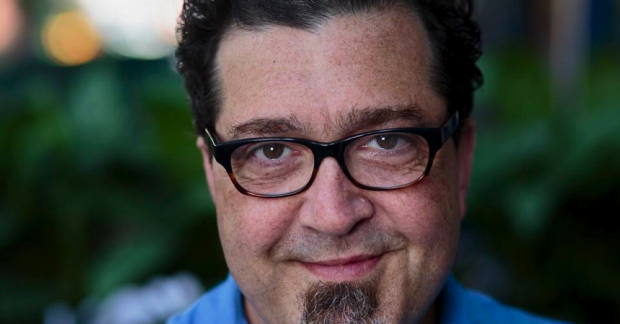Interview: David Simpatico Talks About His Musical Twelve Angry Men
”Twelve Angry Men” is now running at Theater Latte Da in Minneapolis.
In his long and prolific career, playwright David Simpatico has made his mark on a wide variety of material, including his acclaimed music-drama The Screams of Kitty Genovese, his gay-themed play Ex-Gay Bar, and the stage adaptation of Disney Theatrical's popular High School Musical.
Now, 10 years after he and composer Michael Holland began working on their musical version of Reginald Rose's classic drama Twelve Angry Men, the show (produced by Theater Latte Da) has finally opened — to rave reviews — at Minneapolis's Ritz Theatre, where it's scheduled to run until July 17.
Simpatico spoke to TheaterMania about the challenges of musicalizing this beloved work, why he changed the ethnicities (but not the gender) of some of the jurors, and his next project, The Life and Death(s) of Alan Turing, which will debut at Chicago Opera Theatre in March 2023.

(© Charles Chessler)
This interview has been edited for length and clarity.
What was the biggest challenge in adapting the play into a musical?
Getting people in and out of songs. We started with more definite songs and distinct text, but now the songs are structured so the music bubbles up from the dialogue; it's like a thought that keeps bubbling and bubbling until it becomes music. There are actually only one or two soliloquies. It was a lot of trial and error to find out how the music and text best fit together, and I must commend Michael for putting his ego aside in writing the score and making it serve the text. I just love to work with composers like Michael who really believe in storytelling.
One of the biggest changes you made to the original script was altering the ethnicities of some of the jurors. Why?
Yes, we made half the cast BIPOC, and the other half white. We always knew we had to adjust the story to keep it relevant to today, while somehow remaining true to the setting of 1957. And, of course, by the time we got back to working on the script for this production, it was after the murder of George Floyd, which happened very close to the theater, and we had to take that into account. So, race is now a factor. I have to say all the people we met in the workshops, as well as the current cast members, were all so helpful and generous in sharing their insights. It was so important for us to speak to a multiplicity of people who are beyond our personal experience.

(© Dan Norman Photography)
While you changed the ethnicities of some of the characters, you didn't add any women? Can you talk about that decision?
First, the Rose estate said it had to be 12 men. But once I got into writing the script, I realized the idea of men and women sitting on a jury had been done before and having only men in this room was just a different and more interesting dynamic. We made this show not just about a trial, but about fathers and sons, the kind of toxic masculinity that makes you feel emasculated if you try to change your mind, and the idea of civil discourse, which is becoming a vanishing element in our society.
Tell me about The Life and Death(s) of Alan Turing. What about his story speaks to you?
I am drawn to life and death stories because that sense of urgency makes my storytelling easier. Anyway, in 2012, Larry Edelson, the founder of American Lyric Theater, commissioned Justine M. Chen, the composer, and I to write an opera. I had eight ideas, including one based on Psycho. And one was based on the life of Alan Turing, who I had just become aware of. A friend of mine was an expert on Turing, which led me to reading the biography, Alan Turing: The Enigma. Turing creates the cyber age, he literally saves the world by cracking the Enigma code just as England was close to being brought to its knees during World War II, and he ultimately creates the computer age. And then they charge him with gross indecency for being a homosexual — and he dies, presumably by suicide, at age 41. How do you kill the savior? To me, that's operatic.
Why is the word "Death(s)" in the title?
We explore several various theories about his death. There's the theory that he swallowed a cyanide-laced apple in his kitchen. Oddly, the police never looked at the apple; they just threw it out. There are people who think it was an accident. And there a people who think he was killed because he was privy to all this top-secret information and who believed he could be bribed to divulge it because he was gay. And the fourth death is our fantasy that he uploaded his soul to the binary universe. But personally, I think he was assassinated!








